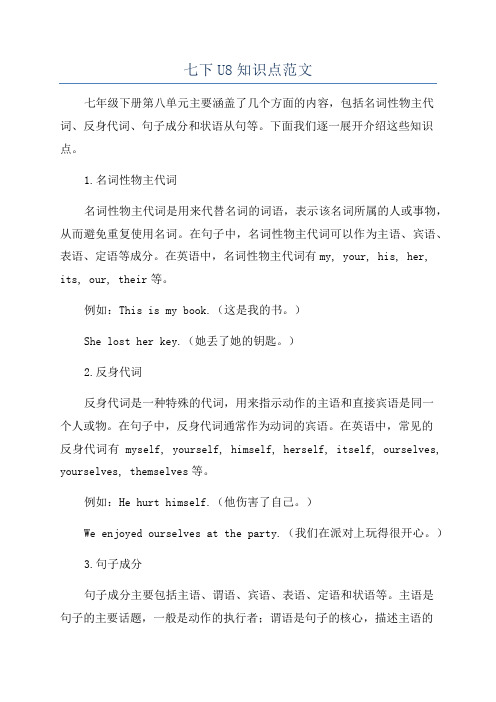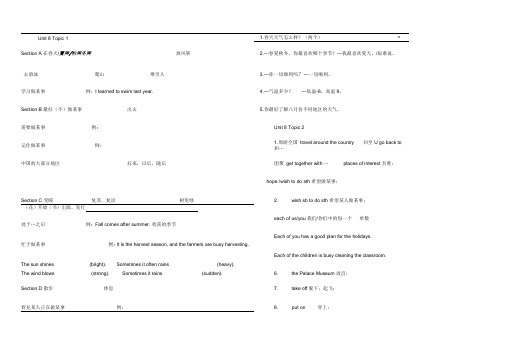七年级u8语法知识点总结
七下U8知识点范文

七下U8知识点范文七年级下册第八单元主要涵盖了几个方面的内容,包括名词性物主代词、反身代词、句子成分和状语从句等。
下面我们逐一展开介绍这些知识点。
1.名词性物主代词名词性物主代词是用来代替名词的词语,表示该名词所属的人或事物,从而避免重复使用名词。
在句子中,名词性物主代词可以作为主语、宾语、表语、定语等成分。
在英语中,名词性物主代词有my, your, his, her, its, our, their等。
例如:This is my book.(这是我的书。
)She lost her key.(她丢了她的钥匙。
)2.反身代词反身代词是一种特殊的代词,用来指示动作的主语和直接宾语是同一个人或物。
在句子中,反身代词通常作为动词的宾语。
在英语中,常见的反身代词有myself, yourself, himself, herself, itself, ourselves, yourselves, themselves等。
例如:He hurt himself.(他伤害了自己。
)We enjoyed ourselves at the party.(我们在派对上玩得很开心。
)3.句子成分句子成分主要包括主语、谓语、宾语、表语、定语和状语等。
主语是句子的主要话题,一般是动作的执行者;谓语是句子的核心,描述主语的动作或状态;宾语接在动词后面,说明主语动作的承受者;表语用来说明主语的特征或状态;定语用来修饰名词或代词;状语用来说明时间、地点、方式、原因等情况。
例如:She is reading a book.(她正在读一本书。
)They gave him a present.(他们给了他一个礼物。
)4.状语从句状语从句是从句的一种,用来修饰主句中的动词、形容词、副词等,在句子中起着状语的作用。
状语从句通常由连词引导,例如when, while, if, because, although等。
Although he is busy, he helps others.(虽然他很忙,但他仍然帮助别人。
七年级上英语八单元知识点

七年级上英语八单元知识点第一部分:基本语法英语八单元主要围绕基本语法展开,从简单的句子构成到复杂的语法形式讲授。
在这里我们将向大家介绍一些常用的基本语法知识点。
1. 英语名词英语名词有三种不同的形式:单数、复数和所有格。
单数指代一个人、事物或者概念,如“book”(书);复数则表示多个事物,如“books”(书籍);所有格则加上“’s”来表示拥有关系,如“Tom’s book”(汤姆的书)。
2. 英语动词英语中的动词有三种基本形态:原形、过去式和过去分词。
例如,“play”(玩)的过去式和过去分词分别是“played”和“played”。
3. 英语时态在英语中,时态包括现在、过去和将来三种形态。
时态形式的变化与动词的不同形态有关,包括简单时态、进行时态、完成时态和将来时态等。
第二部分:实用语法在英语学习的过程中,我们需要掌握更加实用的语法,从而使我们的交流更加准确、流利。
下面我们将关注一些比较实用的语法和表达方式。
1. 表达时间在英语中,我们可以使用时间副词来描述一个动作发生的时间,如“now”(现在)、“today”(今天)、“yesterday”(昨天)、“tomorrow”(明天)等。
2. 表示比较在英语中,我们可以使用“more”和“less”这两个单词来表达比较,如“more difficult”(更难)和“less expensive”(更便宜)。
3. 表示数量在英语中,我们可以使用数字来表示数量,还可以使用单词,如“a lot of”(很多)、“many”(许多)、“few”(很少)等。
第三部分:词汇除了基本语法和实用语法,词汇也是英语学习不可或缺的部分。
掌握更多的词汇可以帮助我们更好地表达我们的意思。
1. 英语动词在英语中,动词是一个非常重要的词汇类别,特别是在英语口语中。
一些常用的动词包括“to be”(是)、“to have”(拥有)、“to do”(做)等。
2. 英语名词名词是表达事物的重要词汇类别,在英语中有很多不同的名称。
七下U8知识点

Unit 8 Topic 1 1.春天天气怎么样?(两个)= Section A 在春天/夏天/秋天冬天放风筝 2.---春夏秋冬,你最喜欢哪个季节?---我最喜欢夏天。
/很难说。
去游泳爬山堆雪人 3.---你一切顺利吗?---一切顺利。
学习做某事例:I learned to swim last year. 4.---气温多少?---低温-8,高温9。
Section B 最好(不)做某事出去 5.你最好了解八月份不同地区的天气。
需要做某事例:Unit 8 Topic 2记住做某事例:1.周游全国travel around the country 回至U go back to 和…中国的大部分地区后来,以后,随后团聚get together with …places of interest 名胜;hope /wish to do sth 希望做某事;Section C 变暖复苏,复活树变绿 2. wish sb to do sth 希望某人做某事;(花)开放(书)岀版,发行each of us/you我们/你们中的每一个单数处于…之后例: Fall comes after summer. 收获的季节Each of you has a good plan for the holidays.忙于做某事例: It is the harvest season, and the farmers are busy harvesting.Each of the children is busy cleaning the classroom. The sun shines (bright). Sometimes it often rains (heavy).The wind blows (strong). Sometimes it rains (sudden). 6. the Palace Museum 故宫;Section D 散步休息7. take off脱下;起飞;看见某人正在做某事例:8. put on 穿上;9. gift money 压岁钱;9. prepare for ____ 为. 做准备;10. be different from ——与不同;10. put up举起;挂起;11. point to / at 指向.... 11. stay up 熬夜;12. pass sth to sb = pass sb sth 把•…••传给某人;12. at midnight 中午夜;13. the day before yesterday 前天;13. knock on 敲;打....14. wrap sth in ------ 用.... 包裹•…14. go up上升;15. go on a trip 去旅行;15. start with ----以... 开始;Topic 3 16. congratulations on sth 祝贺某事1. Spring Festival 春节;17. congratulations to sb 祝贺某人2. Lantern Festival 元宵节;18. 后加doing的词组3. Christmas 圣诞节;19. practice doing4. Thanksgiving 感恩节;20. enjoy doing5. each other = one another 彼此;21. feel like doing6. not —— un til 直至寸.. 才 ... 22. finish doing7. play a trick/ joke on sb 开.... 的玩笑;23. can' t help doing8. show sth to sb展示某物给某人;24. look forward to doing25. pay attention to doing26. make a contribution to doing27. give up doing少年智则国智,少年富则国富,少年强则国强,少年独立则国独立,少年自由则国自由,少年进步则国进步,少年胜于欧洲,则国胜于欧洲,少年雄于地球,则国雄于地球。
七年级上册u8知识点总结

七年级上册u8知识点总结七年级上册的第八个单元主要学习的是“交朋友,问路”的相关知识点。
这个单元的学习是非常实用的,可以帮助我们在生活中更容易地与人交流,解决问题。
本文将对七年级上册U8单元的知识点进行总结。
一、日常交际用语日常交际用语是我们学习语言的重要组成部分。
在这个单元中,我们学习了如何用英语问好、道别、感谢、自我介绍和介绍他人等基本交际用语。
1. 问候语1) Good morning / afternoon / evening.(早上好/下午好/晚上好。
)2) How are you?(你好吗?)3) Fine, thank you. / I'm good. And you?(很好,谢谢。
/我很好。
你呢?)4) Nice to meet you. / It's a pleasure to meet you.(很高兴认识你。
)2. 道别1) Goodbye.(再见。
)2) See you tomorrow.(明天见。
)3) Take care.(保重。
)4) Bye-bye.(再见。
)3. 感谢1) Thank you.(谢谢。
)2) Thanks a lot.(非常感谢。
)3) You're welcome.(不用谢。
)4. 自我介绍1) My name is... / I'm...(我的名字是…/我是…。
)2) I'm from...(我来自…。
)3) I'm in Class... / Grade...(我在…班/年级。
)5. 介绍他人1) This is my friend...(这是我的朋友…。
)2) Let me introduce you to...(让我介绍一下…给你认识。
)二、问路和指路问路和指路是我们在外出旅行或者在陌生地方迷路时的常用技能。
在这个单元中,我们学习了如何用英语问路和指路。
1. 问路1) Excuse me. Can you tell me the way to...?(对不起,请问去…怎么走?)2) Where is...?(…在哪里?)3) How can I get to...?(我怎样才能到达…?)2. 指路1) Turn left / right.(向左/右转。
U8

U8 MAGAZINES知识要点1.重点词汇:operate,switch to,argue over sth.,be proud to do sth.,subscribe,imagine。
in addition (to…),(have sth.)at one’s fingers,available,be sure to do,satisfy,cancel,locate,in disbelief2.重点句型:(1)Why don’t we watch Family Fiction?(2)To find anything in this atlas,we’ll need a microscope.3.重点语法:“It” as formal subject or as formal object知识精讲Vocabulary and Patterns1.add v.加,添加,增加e.g.Please add some water to the tea.请加些水到茶里。
Add 5 to 1,and you’11 get 6./5 added to 1 is 6.5加1等于6。
The bad weather only added to our difficulties.坏天气只是增加了我们的困难。
2.bonus n..(1)意外的收获,红包,红利,奖金give/pay a bonus tO sb.发给某人津贴(2)额外高兴的事情a real bonus一件真正让人额外高兴的事3.operate V.操作,手术operation n.operate on…对……进行手术e.g.The doctor operated on the child’s eyes a few days ago.医生几天前给这个小孩的眼睛动了手术。
4.a programme of interest令人感兴趣的节目nothing of interest没什么令人感兴趣的事a discovery of great importance一项极具重要性的发现5.family friction家庭纠纷(不和)friction摩擦,不和,冲突trade friction贸易冲突political friction政治冲突6.soap drama=--soap opera肥皂剧;连续剧7.argue over/about/on sth.with sb.为某事同某人争吵/争辩/辩论‘=argue with sb.over/about/one.g.I’m tired of arguing over the matter with him.我已厌烦跟他争吵。
2023年人教版七年级英语上册u8第五课时 语法焦点与同步作文指导-课件

写作示例
根据下表所提供的信息,写一篇40字左右的短文介绍你的 朋友Tom,文章的开头已给出。
经典示范
I have a friend. His name is Tom. His birthday is September 8th. He is 13. His phone number is 59596811. His favorite colors are blue and white.
7.Jenny is the fourth (four) girl to come.
8.—How old are you?
—I’m thirteen years (year) old. 9.Hello! I’m the children’s(children) teacher, Miss Gao. 10.I have ten (ten) books.
两,
件要
事么
。旅
。行
,
身
体
和
灵
魂
总
要
我们,还在路上……
eg: Lucy and Lily’s room; Jack’s and Mike’s bags
强化训练
一、根据句意,用所给单词的适当形式填空。
1.—When is David’s (David) birthday?
—It’s on May twenty-fifth (twenty-five). 2.My father has twelve (twelfth)T-shirts.
4.三年的时间 three years’ time
.
5.蒂娜的爷爷的爷爷 Tina’s grandfather’s grandfather .
人教七年级上册u8英语知识点
人教七年级上册u8英语知识点第八单元的英语知识点主要是介绍人物和日常生活。
本文将分别从这两个方面展开具体的讲解,帮助读者更好地掌握知识点。
一、人物1.人物描述在英语中,描述人物时通常需要用到形容词和介词短语。
例如:He is tall and slim. (他高大瘦削。
)She has long curly hair and a sweet smile. (她有一头又长又卷的头发和一个甜美的微笑。
)The girl in the red skirt is my cousin. (穿红裙子的女孩是我的表妹。
)2.询问人物信息在英语中询问人物信息时,需要使用疑问词。
例如:What does he look like? (他长得什么样子?)How old are you? (你几岁了?)Where is your father from? (你父亲来自哪里?)3.回答人物信息回答人物信息时需要使用肯定或否定句。
例如:He is tall and slim. (他高大瘦削。
)No, I am not 15. I am 14. (不,我不是15岁。
我是14岁。
)My father is from England. (我父亲来自英国。
)二、日常生活1.时间与日期在英语中,时间和日期均需要进行表达。
例如:What time is it? (现在几点了?)I have English class on Monday and Thursday. (我周一和周四有英语课。
)2.服饰和颜色在英语中,人们通常需要描述自己的服饰和颜色。
例如:I am wearing a blue T-shirt today. (我今天穿了一件蓝色的T 恤。
)She likes wearing skirts because they are comfortable. (她喜欢穿裙子因为它们很舒服。
)I like the color green because it reminds me of nature. (我喜欢绿色因为它让我想起了大自然。
七年级上册u8知识点
七年级上册u8知识点第八单元为七年级上册的最后一个单元,它的内容主要是关于时间的英语表达和描述,对学生来说是一个比较简单和实用的话题。
本文将围绕着这个主题,介绍一些相关的知识点,帮助读者学习掌握这个单元的内容。
一、时间的英语表达时间是我们日常生活中非常重要的一个方面,英语中也有很多与时间相关的术语和表达方式。
下面列出一些常见的时间表达方式,供大家参考。
1. 时间的基本表达方式小时:hour分钟:minute秒:second2. 表示具体时间用at来表达,比如:at 7 o'clock3. 表示时间段用from...to来表达,例如:from 7 to 8 o'clock4. 表示时间的长短用for来表达,例如:for 30 minutes5. 表示时间与日期的组合用in来表达,例如:in August6. 表示过去或将来的时间用ago和later来表达,例如:an hour ago、one hour later二、构成时间的基本元素在英语中,时间句子的构成一般都包含以下基本元素:1. 时间状语:表示时间的副词或介词短语,例如:yesterday、at 7 o'clock、in August2. 主语:句子的动作或状态的执行者3. 动作或状态:表示主语所做或所处的状态4. 宾语:承受动作的人或事物三、时间状语的种类在英语中,时间状语的种类比较丰富,可以根据时间的不同特点进行分类。
下面列出一些常见的时间状语和它们所表达的含义:1. 现在时间:now、at present2. 过去时间:yesterday、last week、In 19993. 将来时间:tomorrow、next December、next week4. 时间段:for half an hour、from 7 to 8 o'clock、all day long5. 时间频率:often、sometimes、always6. 时间顺序:first、next、then四、时间句子的构成方式时间句子的构成方式一般采用主+谓+宾的形式。
七年级上册u 8知识点总结
七年级上册u 8知识点总结在七年级上册中,第八单元的内容主要围绕着“兴趣爱好”为主题,包括了以下几个知识点。
一、课文阅读课文阅读是英语学习的基础,通过读懂课文可以巩固基础语法和词汇,提高阅读能力、理解能力以及应用能力。
在本单元中,学生需要通过课文阅读,了解家庭成员的兴趣爱好,掌握一些拓展性的词汇和短语。
例如,learning Chinese, playing basketball, watching TV等。
二、语法知识1.动词的-ing形式动词的-ing形式表示的是一种持续性的动作或状态,常用于谈论兴趣爱好等方面。
例如,I like playing basketball. 在这个例句中,playing是动词play的-ing形式。
2.形容词与副词的比较级和最高级在本单元中,学生需要了解和掌握形容词和副词的比较级和最高级的用法。
例如,My sister is taller than me.这个例句中,taller 就是比较级,表示“比……更高”。
3.情态动词shouldshould表示“应该、应当”,常用于表示建议或观点。
例如,We should have a healthy lifestyle. 这个例句中,should就是表示建议的情态动词。
三、口语表达学生需要学会用英语表达自己的兴趣爱好,掌握一些基本的口语表达方式。
例如,What’s your hobby? My hobby is singing.四、写作能力在本单元中,学生还需要掌握一些写作方面的技巧。
例如,用简单句、并列句等方式表达自己的观点和想法。
总之,七年级上册u 8是一个围绕兴趣爱好出发的单元,涉及到了课文阅读、语法知识、口语表达和写作能力等方面。
希望同学们在学习这个单元的时候,能够多加练习,提高自己的英语水平。
U8 Grammar
Sentences from this unit: 1. I want a new pet! 2. How rude you are! 3. … it’s very small and soft … 4. I like her long ears. 5. My goldfish is a wonderful pet. 6. She doesn’t need a gentle touch.
I have a _____ black cat. She likes to run after balls. When she gets tired _____, she sleeps anywhere. She miaows when she is hungry _______. special friend of mine. My parrot is a ______ He is very clever _____, and he can repeat my words. He says “Hello!” when I come back home. He is happy ______ all the time.
1. — Who helped you clean the classroom yesterday? — ______. I cleaned it all by myself. A. Somebody B. Nobody C. Everybody 2. — Can I have some more ice cream, Mum? — Sorry. There is ____ left in the fridge. A. none B. nothing C. no one D. anything
A2 Daniel found two passages about pets
- 1、下载文档前请自行甄别文档内容的完整性,平台不提供额外的编辑、内容补充、找答案等附加服务。
- 2、"仅部分预览"的文档,不可在线预览部分如存在完整性等问题,可反馈申请退款(可完整预览的文档不适用该条件!)。
- 3、如文档侵犯您的权益,请联系客服反馈,我们会尽快为您处理(人工客服工作时间:9:00-18:30)。
Unit 8 The Seasons and the Weather
Topic 1 How is the weather in fall?
核心词汇:
weather, spring, summer, winter, season, warm, mountain, cold, rain, snow, ground, holiday, low, umbrella, remember, wear, sunshine, spend, report, busy, leaf, cloudy, snowy, sunny, windy, rainy, temperature, bright, if, shorts
常用词组:
make a snowman, all day, nice and warm, remember to do sth. need to do sth. later on, all the year round, come back to life, the same as, last from…to (从……持续到……), be busy doing sth. fall from (从……上掉下来)
重点句型:
1.It is a good season for hiking.
2.It is a good time to climb mountains.
3.The ground is white with snow.
4.It’s nice and warm.
5.What’s the weather like in summer?
6.Please remember to wear warm clothes.
7.You need to wear sunglasses.
8.Many trees and flowers come back to life.
9.The farmers are busy harvesting.
10.The leaves fall from the tree.
11.Winter lasts from December to February.
交际用语:
1.–What ‘s the weather like in spring? –It’s warm.
2.– How was the weather yesterday? – It was cloudy all day.
3.– Which season do you like best, spring, summer, fall or winter? – I like summer best.
4.–What’s the temperature, do you know?
– The low temperature is 20℃ and the high temperature is 25℃
5 It’s hard to say.
语法精粹:
一般现在时与一般过去时的用法比较
Topic 2 The summer holidays are coming.
核心词汇:
travel, country, hope, together, interest, each, expensive, camera, raincoat, map, trip, enter, off, wet, point, touch, finger, paper, gift, pass, during, greeting, tent
常用词组:
talk about, take pictures, get together with, places of interest, a pair of, and so on, go on a trip, take off, point to, pass…to…, gift money, t he day before yesterday
重点句型:
1.The summer holidays are coming soon.
2.I wish to travel around the country and take pictures.
3.I hope to get together with them.
4.What’s the best time to go there?
5.What should I take with me?
6.How long were you there?
7.It is very different from ours.
交际用语:
1.– I hope you all have a good time. – You, too.
2.It sounds really interesting!
3.– How was your trip? – It was wonderful!
4.Please give my love to your parents.
语法精粹:
一般过去时的特殊疑问句形式。
Topic 3 Let’s celebrate!
核心词汇:
festival, Christmas, potato, sweet, luck, riddle, special, believe, important, prepare, open, grape, whole, lucky, knock, shout, labor, international, hold, race, national, capital, flag, burn, god
常用词组:
stay up, put up, play tricks on, prepare for, at the end of, knock on/at
重点句型:
1.It means the end of the Spring Festival.
2.People show their love to their mothers by giving presents.
3.People are busy preparing for Christmas.
4.They give Christmas cards to their friends and decorate Christmas trees with lights and
colorful balls.
5.Children put up stockings by the fireplaces.
6.In China, celebrating Spring Festival is a big event.
7.On the eve of the festival, the whole family get together for a big dinner.
8.People stay up and enjoy dumplings at midnight for good luck.
9.Children greet their parents and get lucky money as new year gifts.
交际用语:
1.Merry Christmas! 2 Let’s celebrate.
3Please give my best wishes to your parents.
语法精粹:
一般过过去时(Ⅲ)。
